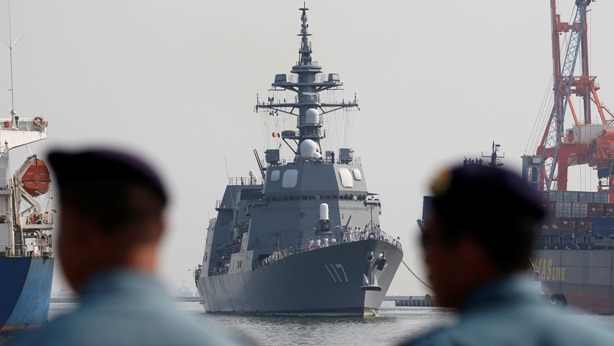Japan seeks to expand cooperation in sharing defense intelligence with partners such as India, Australia and the U.K., broadening the scope of its state secrets law to include exchanges with countries beyond the U.S. The expansion came in last month’s revision of standards for the legislation, which already covers Washington, Tokyo’s closest ally. The law — enacted in 2014 amid controversy — sets penalties of up to 10 years in prison for leaking secrets deemed to risk “causing severe damage to Japan’s national security,” covering areas such as defense, diplomacy and counterterrorism.
Classifying information from a foreign military as a state secret will facilitate joint exercises and tie-ups for developing equipment. It also becomes easier to share data on Chinese troop movements, an increasingly crucial issue as it has grown harder for Tokyo to track Beijing’s activities in the region on its own.
Chinese Coast Guard vessels sailed through waters in the East China Sea around the Japan-administered Senkaku Islands, which are claimed by China as the Diaoyu, for a record 80th consecutive day on Thursday. Beijing has tightened its effective control over the South China Sea, a critical sea lane, as well.
The law change is geared toward the U.K., Australia, India and France, with which Japan has signed agreements that obligate both sides to keep classified defense information secret. Reducing the risk of leaks should encourage these countries to share confidential data.
The revision also serves to promote broader cooperation under security legislation that took effect in 2016, letting Tokyo exercise the right to collective self-defense and supply fuel and ammunition to other militaries in situations that pose a threat to Japan. Carrying out such tasks requires information on the size, capacity and operating areas of these forces, which can include highly secret data.
The move reflects the trend of Tokyo branching out in defense partnerships during recent years. Japan’s Self-Defense Forces and the Australian military conducted joint drills involving fighter jets in Japan for the first time last fall, and the Maritime Self-Defense Force has participated in the U.S.-India Malabar naval exercise every year since 2015.
The tie-ups also include joint development of defense equipment, which often requires sharing powerful and classified technology. Japan and the U.K. have created a prototype air-to-air missile, and Tokyo is teaming with Paris on technology to detect underwater mines using unmanned craft.
Japan plans to involve the U.K. in development of its successor to the F-2 fighter jet, slated for deployment in the mid-2030s. Though Tokyo picked Washington over London as its main partner, Japan looks to share stealth technology with the U.K., which is working on its own next-generation fighter.













